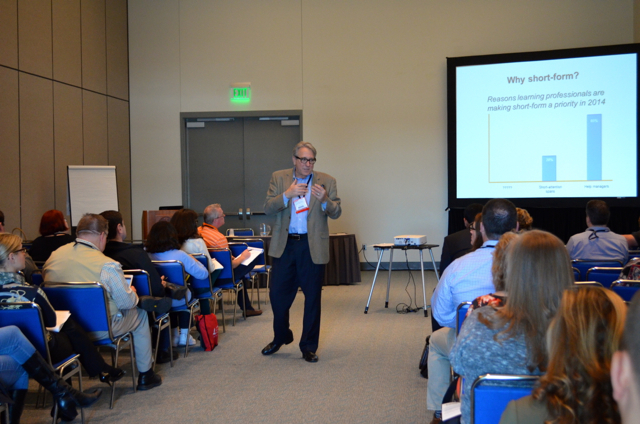Single-Concept Learning Explained by RLI CEO Stephen Meyer at Training 2014 Conference
February 10, 2014 (PRLEAP.COM) Education News
"Utilization rates with soft-skills e-learning were shockingly low in the past because e-learning developers tried to do too much. The key to getting modern learners engaged in e-learning is 'single-concept learning,' " said Rapid Learning Institute CEO Stephen Meyer at the Training 2014 conference in San Diego. Single-concept learning differs from other strategies for creating short-form e-learning such as chunking and learning compression, both of which start with a large body of learning and deliver it in smaller segments. Single-concept learning takes the opposite tack. "It's the discipline of 'starting small,' " said Meyer. "It's about identifying a 'thin slice' of learning, a single compelling idea that's designed to change one behavior and lead to one specific outcome."
Meyer stated that this approach increases user engagement because learners are less reluctant to engage in a learning journey that's narrowly defined and lasts just six to 10 minutes. An added benefit is that managers are more likely to use single-concept learning modules as coaching tools because they feel they have the skillset to coach people on a single learning concept and believe they can accomplish that goal with a limited time commitment.
Meyer also introduced the concept of "Information Design," which he defined as, "The art of presenting content in a way that engages people." He emphasized that Information Design is not a competitor to instructional design. "It's a companion, a partner," Meyer said. "It's the thing we need to add to e-learning development that's going to finally get users to engage in e-learning the way they should have been all along."
Meyer added that mobile learning will inevitably lead to an increase in more engaging short-form e-learning. "M-learning is by definition e-learning," Meyer said. "E-learning developers need to visualize a learner on a mobile device at the airport with 10 minutes to kill before boarding the plane. And they need to ask, 'What do I need to do to capture and sustain that person's attention? What Information Design strategies can I deploy to create a video that's so compelling she won't get distracted and bail?' "
See more at: http://rapidlearninginstitute.com/news/masie-presentation
About Rapid Learning Institute
Rapid Learning Institute (RLI) provides online training and talent development tools for businesses, government agencies, nonprofits and educational institutions in the areas of sales, human resources, management, leadership and safety. RLI's approach is founded on three core principles: 1) Rapid Learning. Workplace training should be delivered in short bursts – just five to 10 minutes at a time. Today's multi-tasking workforce has neither the time nor the attention span for traditional lengthy training formats. 2) Single Concept Learning. People learn best when training is focused on a discrete, narrowly defined concept where learning goals are clearly defined. When training is delivered in small packets, the brain can easily absorb, remember and apply what it learns. 3) Research-Based Learning. Training is most powerful when it's grounded in verifiable research. When learners see training as credible, they're more likely to translate the learning into on-the-job behavior. RLI's signature five to 10 minute modules, called Quick Takes, incorporate these three ideas into unique training programs that get results.
Based in Greater Philadelphia, RLI is an operating division of Business 21 Publishing.
